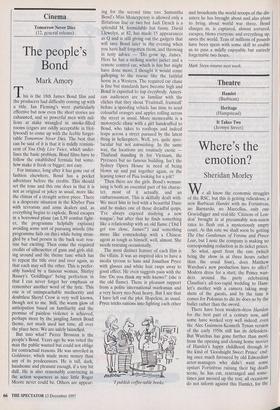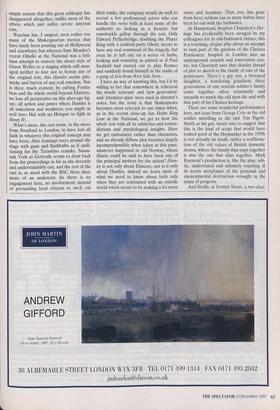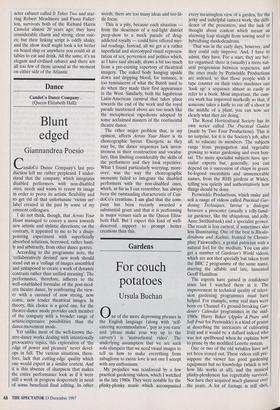Theatre
Hamlet (Barbican) Heritage (Hampstead) It Takes Two (Jermyn Street)
Where's the emotion?
Sheridan Morley
We all know the economic struggles of the RSC, but this is getting ridiculous; a new Barbican Hamlet with no Fortinbras, no Barnardo, no Marcellus, only one Gravedigger and real-life 'Citizens of Lon- don' brought in at presumably non-union rates to flesh out a mysteriously empty court. At this rate we shall soon be getting The One Gentleman of Verona and Prince Lear, but I note the company is making no corresponding reduction in its ticket prices.
So what, apart from the cuts (which bring the show in at three hours rather than the usual four), does Matthew Warchus's new production have to offer? Modern dress for a start; the Prince wan- ders around the party celebrating Claudius's all-too-rapid wedding to Ham- let's mother with a camera taking mug- shots of the guests, and by the time it comes for Polonius to die he does so by the bullet rather than the sword.
There have been modern-dress Hamlets for the best part of a century now, and some have worked very well indeed; even the Alec Guinness-Kenneth Tynan version of the early 1950s still has its defenders. But Warchus has gone further than most; from the opening and closing home movies of Hamlet's happy childhood through to the kind of 'Goodnight Sweet Prince' end- ing once much favoured by old Edwardian actor-managers who didn't want some upstart Fortinbras ruining their big death scene, he has cut, rearranged and some- times just messed up the text; all occasions do not inform against this Hamlet, for the simple reason that this great soliloquy has disappeared altogether, unlike most of the others which just suffer severe internal cuts.
Warchus has, I suspect, seen rather too many of the Shakespearian movies that have lately been pouring out of Hollywood and elsewhere; but whereas Sam Mendes's recent Othello at the National was a bril- liant attempt to convert the closet style of Orson Welles to a staging which still man- aged neither to lose nor to betray any of the original text, this Hamlet seems gim- micky and barren of any real emotion. Nor is there much context; by cutting Fortin- bras and the whole world beyond Elsinore, we lose all perspective on this alter-ego fig- ure, all action and power where Hamlet is all indecision and weakness; you might as well have Hal with no Hotspur to fight in Henry IV.
What's more, the cast seem, in the move from Stratford to London, to have lost all faith in whatever this original concept may have been; Alex Jennings races around the stage with guns and flashbulbs as if audi- tioning for the Tarantino remake, Susan- nah York as Gertrude seems to draw back from the proceedings as far as she decently and understandably can, and the rest of the cast is, as usual with the RSC these days, more of an undercast. So there is no engagement here, no involvement; instead of persuading local citizens to swell out their ranks, the company would do well to recruit a few professional actors who can handle the verse with at least some of the authority so lacking in a frenetic but ramshackle gallop through the text. Only Edward Petherbridge, doubling the Player King with a cocktail-party Ghost, seems to have any real command of the tragedy, but even he is left out on a series of limbs, looking and sounding as pained as if Paul Scofield had started out to play Romeo and suddenly found himself in the midst of a gang of Jets from West Side Story.
I have no way of knowing this, but I'd be willing to bet that somewhere in rehearsal the words 'relevant' and 'new generation' and 'attention span' were used in director's notes, but the irony is that Shakespeare becomes most relevant to our times when, as in the recent close-up Ian Holm King Lear at the National, we get to hear the whole text with all its subtleties and contra- dictions and psychological insights. Here we get caricatures rather than characters, and an already diffuse plot becomes largely incomprehensible when taken at this pace; whatever happened to old Norway, whose illness could be said to have been one of the principal motives for the action? Ham- let is not only about Elsinore, nor is it only about Hamlet; indeed we learn most of what we need to know about both only when they are contrasted with an outside world which seems to be making a lot more sense and headway. That, too, has gone from here; seldom can so many babies have been let out with the bathwater.
At Hampstead, Stephen Churchett's Her- itage has predictably been savaged by my colleagues for its old-fashioned virtues; this is a touching, elegiac play about an attempt to turn part of the gardens of the Chelsea Pensioners' hospital in London into an underground carpark and convention cen- tre, but Churchett uses that slender thread of plot to sketch in the family of one of the pensioners. There's a gay son, a betrayed daughter, a wandering grandson; three generations" of one veteran soldier's family come together often reluctantly and uneasily to watch the old man die and with him part of his Chelsea heritage.
There are some wonderful performances here, not least from George Cole as the old soldier unwilling to die and Tim Pigott- Smith as his gay, weary son; to suggest that this is the kind of script that would have looked good at the Haymarket in the 1950s is not actually an insult, rather a reaffirma- tion of the old values of British domestic drama, where the family that stays together is also the one that slays together. Mark Rayment's production is, like the play, sub- tle, understated and infinitely touching in its weary acceptance of the personal and environmental destruction wrought in the name of progress And finally, at Jermyn Street, a two-char- acter cabaret called It Takes Two and star- ring Robert Meadmore and Fiona Fuller- ton, survivors both of the Richard Harris Camelot almost 20 years ago; they have considerable charm and strong, clear voic- es; but their linking script is oddly shaky, and the show itself might look a lot better on board ship or anywhere you could sit at tables to eat and drink. All the same, it's an elegant and civilised cabaret and there are all too few of those around at the moment on either side of the Atlantic.




















































































 Previous page
Previous page